Enterprise SaaS SEO is complex – spanning multiple buyer personas, long sales cycles, and large-scale sites. Success requires a strategic mix of technical SEO, full-funnel content, programmatic pages, and close collaboration with sales and product teams. It’s not about chasing traffic – it’s about driving qualified pipeline from organic search at scale.
Scaling your enterprise SaaS company? It’s not for the weak, that’s for sure.
You have razor-thin margins for error and fierce competition, and your buyers are navigating mazes, not pipelines.
So, how do you drive growth without breaking the bank? With enterprise SEO. It’s the most cost-effective way to capture high-intent traffic, outsmart your competitors, and turn your sprawling website into a lead-generating powerhouse.
Pressed for time? We’ve got you covered!
Key takeaways
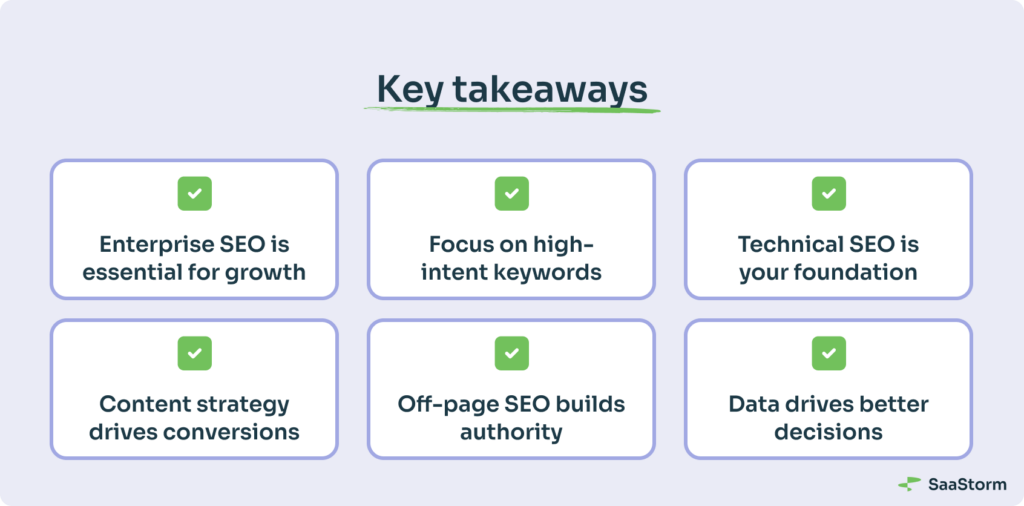
- Enterprise SaaS SEO is essential for growth: It’s the most cost-effective way to capture high-intent traffic, outrank competitors, and drive measurable results.
- Focus on high-intent keywords: Target decision-makers like CMOs and CTOs with long-tail phrases that align with buyer intent.
- Technical SEO is your foundation: Optimise crawl budgets, Core Web Vitals, and site architecture to ensure scalability and performance.
- Content strategy drives conversions: Use pillar pages, topic clusters, and content mapped to the buyer journey (TOFU, MOFU, BOFU) to guide prospects toward action.
- Off-page SEO builds authority: Invest in link-building, digital PR, and social amplification to boost visibility and trust.
- Data drives better decisions: Track key metrics like organic traffic, keyword rankings, and conversion rates using dashboards and analytics tools.
Whether you’re building an SEO strategy from scratch or refining an existing one, this guide builds on our B2B SaaS SEO guide.
Enterprise SEO for SaaS companies is the key to scaling organic growth while addressing the unique challenges of complex buyer journeys and high competition. SEO for enterprise businesses goes beyond traditional tactics, focusing on scalability and long-term impact.
Here’s why you should care…
Why Enterprise SaaS SEO Matters
Enterprise SaaS growth is expensive—ads, outbound sales, and scaling teams add up fast. But SEO flips the script. It’s cost-effective, builds trust with your audience, and delivers long-term results.
When done right, search engine optimisation (SEO) isn’t just a marketing channel—it’s your competitive power. Show up where your buyers are searching, outrank the competition, and turn clicks into conversions.
Unlock enterprise-level growth with expert SaaS SEO. Let’s talk!
Schedule a CallUnique challenges in enterprise SaaS SEO
Enterprise SaaS SEO isn’t your average SEO playbook. You’re not just targeting keywords—you’re navigating a minefield of challenges only enterprise businesses face.
- Complex buyer journeys: Your customers don’t follow a linear path. They jump between touchpoints, evaluate options endlessly, and loop in multiple decision-makers.
- Huge websites: Managing thousands of pages is a balancing act. Without the right strategy, indexing errors, crawl issues, and technical debt pile up fast.
- High competition: You’re up against industry giants with deep pockets and entire teams dedicated to staying ahead.
Enterprise SEO strategies for SaaS companies are essential to outperform industry giants and secure visibility in competitive search results.
An enterprise SEO team is crucial to managing these complexities and ensuring visibility. To achieve success, these teams coordinate with various departments, such as marketing, analytics, and development.
These hurdles make enterprise SEO tricky—but they also make it essential. And the first step to overcoming these challenges? Building a rock-solid technical foundation.
Building the foundation: Technical SEO for enterprise SaaS
No matter how strong your content or keyword strategy is, it’s nothing without a solid technical base.
For enterprise SaaS websites, technical SEO is the backbone that supports everything from scalability to site performance.
An enterprise SEO platform is crucial in managing technical SEO tasks and ensuring scalability.
Key technical SEO strategies
Technical SEO can feel overwhelming, but it boils down to getting the basics right—especially for large enterprise websites. Here’s where to focus:
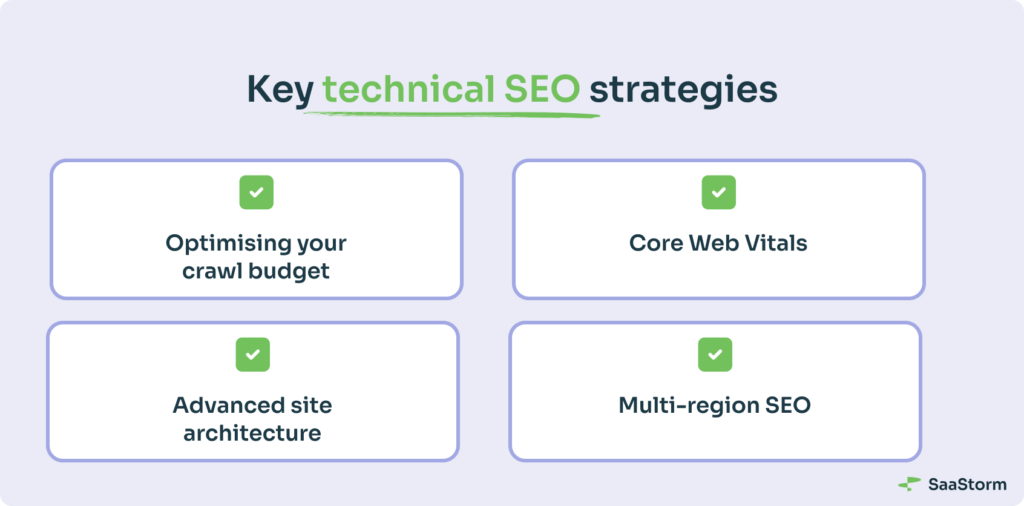
- Optimising your crawl budget: Search engines like Google have a limit on how much of your site they’ll crawl. Use tools like Screaming Frog or DeepCrawl to identify low-value pages that can be no-indexed, ensuring crawlers spend time on your highest-priority content.
- Core Web Vitals: Page speed, mobile responsiveness, and stability aren’t just for UX—they’re ranking factors. Regularly audit your site using Google’s PageSpeed Insights and make fixes to keep performance sharp.
- Advanced site architecture: Choose between subdomains and subdirectories wisely. For enterprise SaaS, subdirectories often deliver better SEO outcomes by consolidating authority under one domain.
- Multi-region SEO: If you operate globally, don’t skip hreflang tags. These tell search engines which version of your site to show in different regions, preventing duplicate content issues.
Enterprise SEO optimisation requires a detailed approach to technical fixes, ensuring scalability and performance across all site pages.
Tools for technical SEO
Choosing the right enterprise SEO tool ensures you can efficiently manage audits, track performance, and identify optimisation opportunities. Here are some of the best ones for enterprise SaaS:
- Screaming Frog, DeepCrawl, and Sitebulb: For comprehensive audits that uncover crawl issues, broken links, and duplicate content.
- Google Search Console: A free essential for monitoring indexing, crawling, and site performance.
- PageSpeed Insights: This is for diagnosing speed and performance issues affecting your Core Web Vitals.
The best SaaS SEO tools to streamline your technical audits and uncover new opportunities.
By prioritising these technical strategies and tools, you’ll create a strong foundation that supports every other aspect of your SEO efforts.
The best enterprise SEO tools not only streamline audits but also provide actionable insights for enterprise SEO optimisation.
Enterprise keyword strategy: Going beyond basics
Keyword strategy at the enterprise level isn’t about chasing volume—it’s about precision.
Learning how to do enterprise SEO effectively starts with identifying high-intent keywords and aligning them with your audience’s needs.
Your audience is niche, and your keywords should reflect that.
Enterprise SEO platforms are crucial in scaling keyword research and strategy by integrating multiple SEO functionalities, automating tasks, and enhancing stakeholder collaboration.
Here’s how to go beyond the basics and uncover the terms that drive results.
Dominate search results & drive leads with enterprise SaaS SEO. Let’s chat!
Schedule a CallHigh-intent keywords for SaaS
Generic keywords like “CRM software” or “SaaS tools” won’t cut it for enterprise businesses. Instead, focus on high-intent keywords that speak to your target audience’s decision-makers, like CMOs, CTOs, or VPs of Marketing.
Enterprise SEOs play a crucial role in identifying these high-intent keywords and optimising for them, ensuring that the content aligns with the needs of decision-makers.
Example
Instead of “project management tools,” target “enterprise project management software for remote teams.” Understanding what enterprise SEO is and how high-intent keywords drive conversions is fundamental to building a successful strategy.
Why it works: These long-tail phrases are specific, actionable, and aligned with buyer intent, making them more likely to convert.
Scaling keyword research
Enterprise SaaS companies often have multiple products or features targeting different verticals. That means scaling your keyword research is crucial.
Enterprise SEO teams play a vital role in scaling keyword research and ensuring stakeholder collaboration to align SEO strategies with broader corporate goals.
Clustering keywords
Use tools like Ahrefs or Semrush to group keywords into clusters. For instance, a “collaboration software” cluster might include terms like “team collaboration tools” and “collaboration software for enterprises.”
An effective enterprise SEO dashboard can track keyword performance across multiple verticals, ensuring your strategy remains on target.
Automation tools
Automate your bulk research. Platforms like Keyword Insights or SurferSEO can help speed up clustering and provide actionable insights for large datasets.
With the right keyword strategy, you’ll capture the specific search queries your audience is using—and leave the competition chasing after irrelevant traffic.
Content strategies for enterprise SaaS SEO
Enterprise SaaS content isn’t about writing more—it’s about creating the right content. For an enterprise website, your buyers aren’t just looking for information; they’re looking for solutions tailored to their complex challenges. Here’s how to build content that drives actual results.
Developing pillar pages and topic clusters
Strong pillar pages and well-connected topic clusters are the backbone of your enterprise content strategy for effective search engine optimisation. Here’s how to approach them:
- Pillar pages: Create in-depth, evergreen guides around key topics your audience searches for, like “Enterprise CRM Implementation.” Pillar pages are crucial for improving visibility in search engine results pages (SERPs), essential for attracting organic traffic and increasing rankings.
- Topic clusters: Develop supporting articles like “How to Choose an Enterprise CRM” or “Enterprise CRM Setup Checklist” to link back to your pillar pages. Pillar pages are the cornerstone of enterprise-level SEO, consolidating authority and boosting rankings for related content clusters.
Why it works: This structure establishes topical authority, improves internal linking, and ensures your content ranks for related queries.
Content mapping for the buyer journey
Your buyers don’t just stumble onto a pricing page and convert—they need guidance. Match your content to each stage of the journey:
- Awareness (TOFU): Blogs, infographics, and thought leadership to introduce your solution.
- Consideration (MOFU): Case studies, comparison pages, and webinars that answer detailed questions.
- Decision (BOFU): Pricing pages, product demos, and free trial offers to close the deal.
A successful enterprise SEO strategy plays a crucial role in mapping content to the buyer journey, ensuring that each piece of content aligns with your audience’s specific needs and questions at every stage.
Why it works: By delivering the right content at the right time, you create trust and reduce friction in the buying process.
Optimising enterprise SaaS blogs
It’s not just about publishing—it’s about making every blog work harder for your business. Focus on:
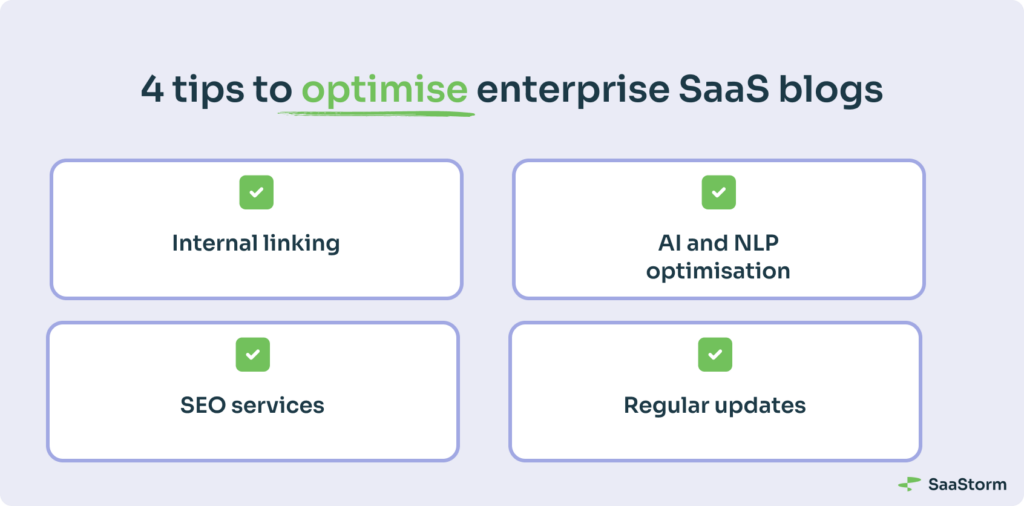
- Internal linking: Point to relevant pages (like product or pillar pages) to guide readers deeper into your site. Enterprise SEO audits often reveal opportunities to refine internal linking structures and improve content performance.
- AI and NLP optimisation: Use tools like SurferSEO or Clearscope to optimise your blogs for search engines and natural language queries.
- SEO services: Leverage enterprise SEO services to optimise your blog content for better performance, enhancing online visibility and handling high inbound traffic.
- Regular updates: To keep them relevant, refresh high-performing blogs with updated stats, examples, and CTAs.
With your content strategy in place, it’s time to tackle what happens on your website.
On-page SEO for enterprise SaaS
On-page SEO is a cornerstone of enterprise SaaS SEO, focusing on optimising individual web pages to achieve higher rankings in search engines. It involves activities like:
- Optimising page titles and meta descriptions.
- Using proper header tags to structure your content.
- Ensuring content is high-quality, keyword-rich, and relevant.
- Building a strong internal linking strategy.
Effective on-page SEO ensures that every page on an enterprise website is fully optimised to attract and convert visitors.
Optimising page titles and meta descriptions
Page titles and meta descriptions are critical elements of on-page SEO and often serve as the first point of contact between your website and search engines.
For enterprise SaaS companies, optimising these elements involves:
- Incorporating relevant keywords to align with search intent.
- Making them descriptive, compelling, and unique for each page.
- Helping search engines understand the relevance and content of each page.
Well-optimised page titles and meta descriptions:
- Improve visibility in search engine results pages (SERPs).
- Boost click-through rates (CTR).
- Ensure the right audience finds your content, driving more qualified traffic to your site.
While on-page SEO ensures your website is primed for visibility and conversions, it’s only part of the equation.
To truly dominate search rankings and establish your authority, you need to look beyond your own pages.
That’s where off-page SEO comes in.
Off-page SEO for enterprise SaaS
Your website content is only half the battle. To truly dominate search results, you need a strong off-page SEO strategy that builds authority and trust across the web.
With their large size and complex architectures, enterprise sites face unique challenges in this area. Here’s how enterprise SaaS companies can win off the page.
Struggling with enterprise SaaS SEO? We’ve got you covered — reach out!
Schedule a CallEnterprise link-building strategies
Not all backlinks are created equal. For enterprise SaaS, it’s about securing links that boost authority and drive relevant traffic through effective search engine optimisation.
- Focus on high-authority SaaS publications: Partner with sites your target audience already trusts. (Think TechCrunch or SaaS-focused blogs.) Partnering with a trusted B2B SaaS link-building agency can help secure high-authority backlinks and build your domain authority.
- Leverage customer success stories: Encourage customers to share their experiences with your product on their websites or in guest posts.
- Avoid spammy tactics: Google penalises poor-quality backlinks, so prioritise quality over quantity.
The best enterprise SEO agencies focus on building high-quality backlinks that enhance domain authority and drive targeted traffic. Partnering with the best enterprise SEO agency ensures your link-building strategy is both scalable and results-driven.
Pro Tip: Instead of chasing backlinks for every blog post, focus on your pillar pages.
Digital PR for enterprise SaaS
Digital PR isn’t just for big brands—it’s a powerful tool for SaaS companies. You can attract coverage and build high-value links by sharing thought leadership and unique insights.
- Pitch data-backed insights: For example, share survey results or industry trends that journalists and bloggers can’t resist.
- Collaborate with industry experts: Co-author articles or host joint webinars to broaden your reach and credibility.
- Invest in thought leadership: Having your executives publish on LinkedIn or industry sites can position your brand as a trusted authority.
Enterprise SEO consultants often recommend digital PR as a core strategy for boosting off-page authority and earning valuable links. Working with an enterprise SEO consultant can help identify high-impact PR opportunities that align with your SEO goals.
Did you know?
Pages that earn backlinks from reputable sites rank higher 48% of the time, according to studies on SEO performance. Prioritise collaborations and PR campaigns that drive valuable links back to your site.
Social signals and SaaS SEO
While social media doesn’t directly impact rankings, it amplifies your content’s visibility, making it easier to earn backlinks and boost traffic.
- Share strategically: Promote your content on LinkedIn, where enterprise SaaS buyers are most active.
- Encourage employees to share: Your team’s network can dramatically extend the reach of your content.
- Engage with niche communities: Join SaaS-related groups and forums to share insights and link to your content (when relevant).
Off-page SEO builds your authority, but how do you measure success? Let’s explore the key metrics and tools for tracking your enterprise SEO performance.
Data-driven enterprise SEO: Leveraging analytics and dashboards
When it comes to enterprise SEO, what gets measured gets improved. Without tracking the right metrics, you’re flying blind—a risk you can’t afford. Let’s look at how to make data your secret weapon.
Essential enterprise SEO metrics to track
For enterprise SaaS companies, not all metrics are created equal. Focus on these to gauge success and uncover opportunities:
- Organic traffic growth: Keep an eye on how many visitors are finding you via search.
- Keyword rankings: Are you moving up for high-intent terms?
- Conversion rates: Measure how organic visitors convert into demos, signups, or revenue. Tracking enterprise SEO metrics like lead velocity rate and MQLs provides a clearer picture of your strategy’s ROI.
- Bounce rate and time on page: Understand engagement to improve content effectiveness.
Pro Tip: Set up Google Analytics 4 (GA4) to track events like demo requests, trial signups, and revenue. Combine this with Search Console data to connect rankings to business outcomes.
Building SEO dashboards for enterprise teams
Dashboards provide a bird’s-eye view of your SEO performance—crucial for enterprise teams managing massive sites.
- Use Google Data Studio to build custom dashboards combining data from multiple sources.
- Visualise key metrics like MQLs from organic traffic or high-performing keyword clusters.
- Share dashboards with stakeholders to keep everyone aligned.
SEO consulting for enterprise companies often includes custom dashboards to track high-impact metrics like MQLs and organic conversions.
Did you know?
Teams that regularly review SEO dashboards are more likely to hit their traffic and lead goals. Transparency isn’t just a nice-to-have; it’s a driver of success.
Advanced tools for enterprise SEO analytics
These tools can take your tracking and reporting to the next level:
- Tableau: Ideal for complex visualisations and deep dives into performance data.
- Hotjar or Crazy Egg: Use heatmaps and session recordings to optimise UX and content layout.
- Screaming Frog: Combine technical SEO insights with performance data to identify issues impacting rankings.
Effective enterprise SEO reporting allows teams to track performance, identify trends, and measure ROI more precisely.
Pro Tip: Schedule a weekly review of your dashboards with your marketing and sales teams. Aligning on what’s working (and what isn’t) will help you pivot faster.
SEO consulting for enterprise companies often includes setting up advanced analytics platforms like Tableau or Data Studio to centralise reporting.
Armed with data, you’re ready to stay ahead of the curve. But enterprise SEO isn’t static—trends and technologies are constantly evolving. Let’s explore the future of enterprise SaaS SEO.
Emerging trends in enterprise SaaS SEO
Enterprise SaaS SEO is constantly evolving, and staying ahead of the curve is critical to maintaining your competitive advantage. Here are the trends shaping the future of SEO for SaaS companies—and how to use them to your advantage.
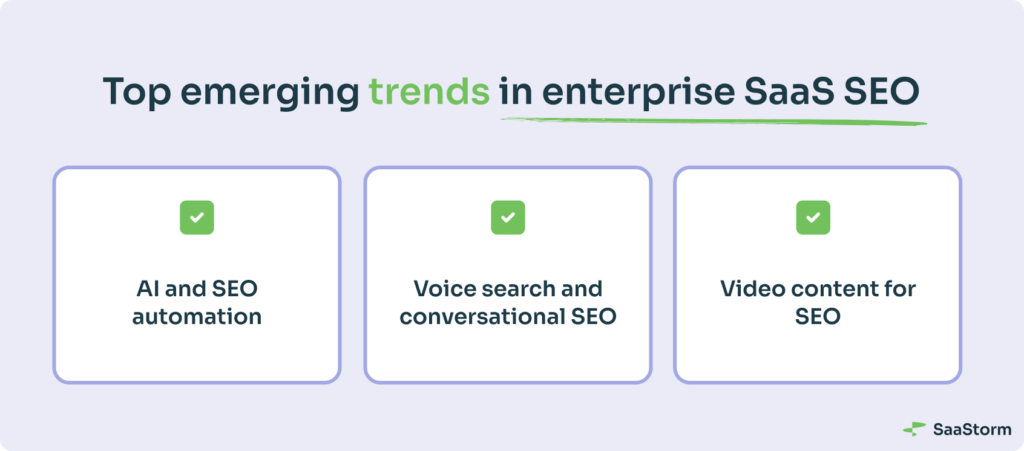
AI and SEO automation
AI is no longer a buzzword; it’s a powerful tool for enterprise SEO.
- Content creation and optimisation: Tools like Jasper and SurferSEO help generate, optimise, and fine-tune content faster than ever.
- SERP analysis: AI-powered platforms like Clearscope can analyse competitor rankings and provide actionable recommendations.
- Automating reporting: Streamline repetitive tasks like rank tracking and performance updates with platforms like Ahrefs or Semrush.
Pro Tip: Enterprise SEO experts increasingly use AI tools to automate keyword research, content optimisation, and trend analysis.
These experts combine AI capabilities with their knowledge to create scalable, data-driven strategies.
However, don’t rely entirely on AI for content creation. Use it to enhance efficiency, but keep a human touch to ensure your content resonates with readers.
Voice search and conversational SEO
With the rise of voice-activated devices, optimising for conversational queries is becoming essential.
- Use schema markup to make your content more accessible to voice assistants like Alexa or Google Assistant.
- Target long-tail, question-based keywords like “What is the best CRM for enterprise teams?”
- Optimise for mobile-first, as voice search queries often come from mobile devices.
To fully capitalise on voice and conversational search, consider implementing answer engine optimisation in SEO as part of your strategy.
Staying ahead of enterprise SEO trends, like voice search optimisation, is critical for maintaining a competitive advantage.
Video content for SEO
Video is exploding as a key driver of engagement and rankings.
- Embed videos on landing pages: This can improve dwell time, a potential ranking factor.
- YouTube SEO: Optimise titles, descriptions, and tags for enterprise-related keywords.
- Repurpose content: Turn webinars or case studies into bite-sized video snippets to share across platforms.
Pro Tip: Host your videos on YouTube and embed them on your site to maximise visibility and rankings on both Google and YouTube searches.
Trends and tactics are essential, but so is knowing what to avoid. Let’s dive into the most common mistakes SaaS companies make with enterprise SEO—and how to sidestep them.
Common enterprise SEO mistakes and how to avoid them
Even the best enterprise SEO strategies can fall apart if you become a victim of common pitfalls. Here are the mistakes that often trip up enterprise SaaS companies—and what to do instead.
Overlooking technical issues on large sites
Enterprise websites often have thousands of pages; even minor technical errors can cascade into big problems. Common issues include:
- Poorly optimised XML sitemaps, leading to missed indexing opportunities.
- Duplicate content from product or feature variations.
- Slow-loading pages that tank your Core Web Vitals scores.
How to avoid it:
Run regular audits using tools like Screaming Frog or Sitebulb to uncover and resolve technical SEO issues before they impact your rankings.
Also, regular enterprise SEO management ensures that technical issues like duplicate content or indexing errors don’t derail your strategy.
Neglecting cross-department collaboration
SEO doesn’t happen in a vacuum. Critical insights and opportunities can be missed without alignment between marketing, product, and sales. For example:
- Sales teams often hear buyer objections that could inspire high-intent blog topics.
- Product updates may introduce new features that need optimised landing pages.
How to avoid it:
Schedule regular cross-department check-ins to share updates, align on goals, and uncover opportunities to improve your SEO strategy.
Prioritising quantity over quality in content
Publishing endless blogs without a clear strategy is a quick way to waste resources. Common symptoms include:
- Thin content that fails to address buyer intent.
- Poorly targeted keywords lead to irrelevant traffic.
- Duplicate posts that compete with each other for rankings.
The best enterprise SEO packages prioritise quality over quantity, focusing on high-value content that aligns with buyer intent.
How to avoid it:
Focus on creating high-value pillar pages and supporting clusters that address specific buyer needs. Always map content to the customer journey to ensure it drives meaningful results.
Pro Tip: Before creating new content, audit your existing assets to identify opportunities for updates or consolidation. Sometimes, improving what you already have yields better results than starting from scratch.
Now that you know what to avoid, let’s wrap things up with a checklist to ensure your enterprise SaaS SEO strategy hits all the right notes.
Final checklist for enterprise SaaS SEO success
Use this checklist to ensure your enterprise SEO strategy hits all the right marks:
Technical SEO
- Optimise your crawl budget by no-indexing low-value pages.
- Pass Core Web Vitals thresholds for speed, responsiveness, and stability.
- Build a logical site architecture with strong internal linking.
- Implement hreflang tags for multi-region SEO to avoid duplicate content issues.
Keyword strategy
- Focus on high-intent, long-tail keywords aligned with buyer intent.
- Cluster keywords into topics to create pillar pages and supporting content.
- Use tools like Ahrefs, Semrush, or Keyword Insights to scale research effectively.
Content strategy
- Develop pillar pages and topic clusters targeting your niche.
- Map content to the buyer journey (TOFU, MOFU, BOFU).
- Regularly update older content with fresh stats, insights, and CTAs.
- Add internal links to guide readers deeper into your site.
Off-page SEO
- Secure high-authority backlinks from reputable SaaS blogs and publications.
- Leverage digital PR campaigns to gain valuable links and brand mentions.
- Promote content on social platforms like LinkedIn to amplify visibility.
Analytics and optimisation
- Create dashboards in Google Data Studio or Tableau to track your SEO performance.
- Monitor key metrics like organic traffic, keyword rankings, and conversion rates.
- Use tools like Hotjar or Crazy Egg to analyse user behaviour and improve engagement.
SaaStorm Recommends:
Revisit this checklist quarterly to assess progress and address gaps. SEO is a continuous process, and minor adjustments over time yield significant results.
Having checklists is great, but seeing these strategies in action can be the best way to understand their impact. Here’s how SaaStorm has helped enterprise SaaS companies achieve exceptional growth through tailored SEO solutions.
How SaaStorm can help with enterprise SaaS SEO
Enterprise SaaS SEO can feel overwhelming, but you don’t have to navigate it alone. At SaaStorm, we specialise in helping enterprise SaaS companies tackle SEO challenges head-on.
Here’s how SaaStorm can support you:
- Expert strategy development: From building pillar pages to refining technical SEO, we craft strategies tailored to your business.
- Fractional SEO leadership: Gain access to seasoned experts who can execute enterprise-level campaigns without the overhead.
Our SaaS enterprise SEO services are designed to handle the complexities of large-scale websites, ensuring every aspect of your strategy is optimised for growth.
As a leading B2B SaaS SEO agency, we specialise in crafting strategies that align with your business goals and drive measurable results.
Our tailored enterprise SEO packages provide the tools, strategies, and expertise you need to scale your organic growth and outpace the competition.
Proven results: Lingio’s 500% traffic growth
When Lingio, a B2B SaaS digital learning platform, approached SaaStorm, their challenges were all too familiar: minimal organic visibility, an empty blog, and heavy reliance on outbound efforts.
With just 45 daily clicks from organic search, their marketing engine needed a serious overhaul.
Here’s how SaaStorm helped Lingio turn things around:
Content creation with purpose
SaaStorm developed 125 high-quality, SEO-optimised content pieces to fill Lingio’s empty blog. These included thought leadership articles, how-to guides, and case studies tailored to Lingio’s target audience.
Technical SEO fixes
A comprehensive site audit uncovered issues slowing their growth—SaaStorm optimised their site structure, improved Core Web Vitals, and ensured every page was crawlable and indexable.
Targeted keyword strategy
Instead of chasing broad terms, SaaStorm identified high-intent keywords that matched Lingio’s niche audience. These keywords formed the backbone of their pillar pages and topic clusters.
Strategic link building
By securing 30+ high-quality backlinks from authoritative sites, Lingio’s domain authority and referral traffic skyrocketed. SaaS link-building complements your digital PR efforts to build authority and drive traffic.
The result? Within just nine months, Lingio saw:
- A 500% increase in organic traffic, with visitors actively engaging with their new content.
- An 11x growth in inbound leads, giving their sales team high-quality opportunities to close.
- Over 50,000 clicks and 2.6 million impressions, making their brand visible to decision-makers.
Ready to transform your SEO strategy?
Schedule a call today, and we’ll:
- Review your current SEO setup.
- Identify quick wins to boost your rankings and traffic.
- Share actionable recommendations—no strings attached.
FAQs
SEO is a long-term investment, and for enterprise SaaS companies, meaningful results typically take 6–12 months. However, quick wins—like fixing technical issues or optimising high-traffic pages—can start showing improvements in as little as a few weeks.
While all metrics matter, conversion-focused metrics like demo sign-ups, trial activations, or leads generated from organic traffic are the most important. These tie directly to your business goals and provide a clear ROI for your SEO efforts.
Not necessarily. Quality beats quantity. A smaller set of well-optimised pillar pages and supporting content clusters can drive more targeted traffic and conversions than hundreds of generic blog posts.
Yes, absolutely. High-quality backlinks remain a crucial ranking factor. Focus on building links from authoritative, relevant websites—think SaaS blogs, industry publications, or partners—to boost your domain authority and organic visibility.
Enterprise SEO focuses on scaling strategies to meet the unique challenges of large SaaS companies. This includes managing complex site structures, targeting niche, high-intent keywords, and optimising thousands of pages while aligning with long sales cycles and multiple buyer personas.


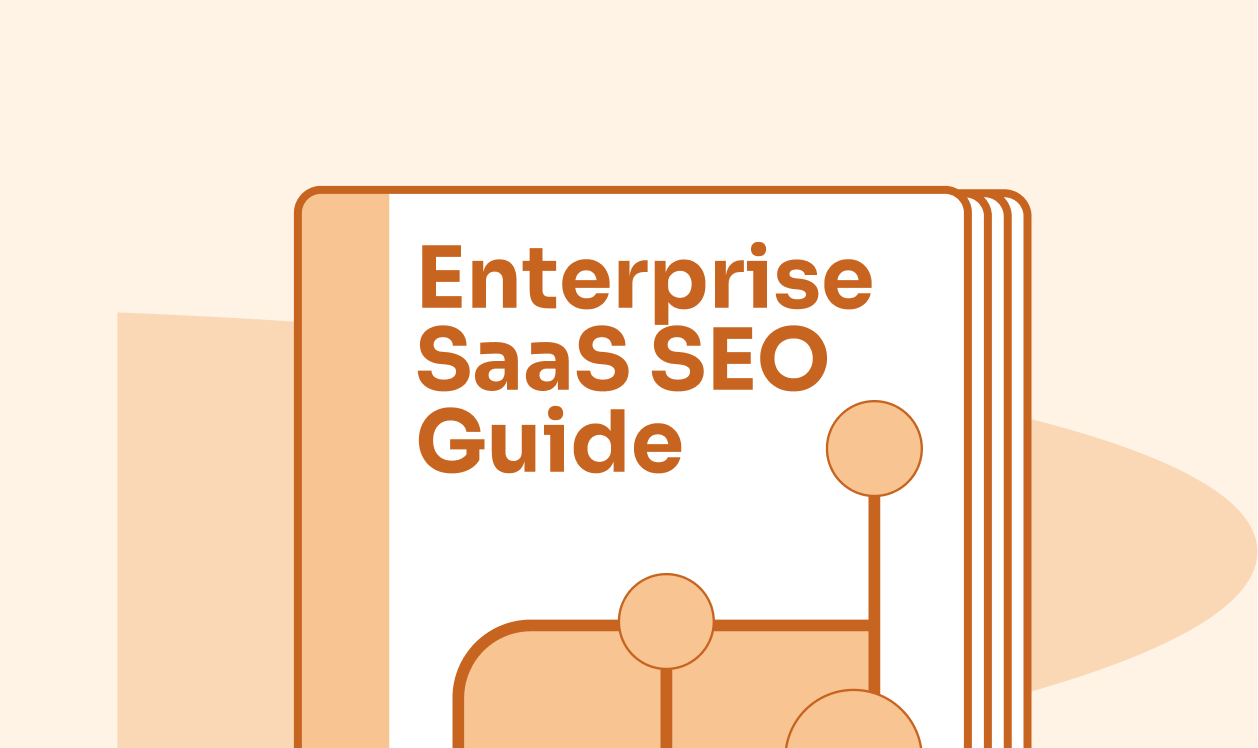
 SaaStorm experts in your inbox.
SaaStorm experts in your inbox.


